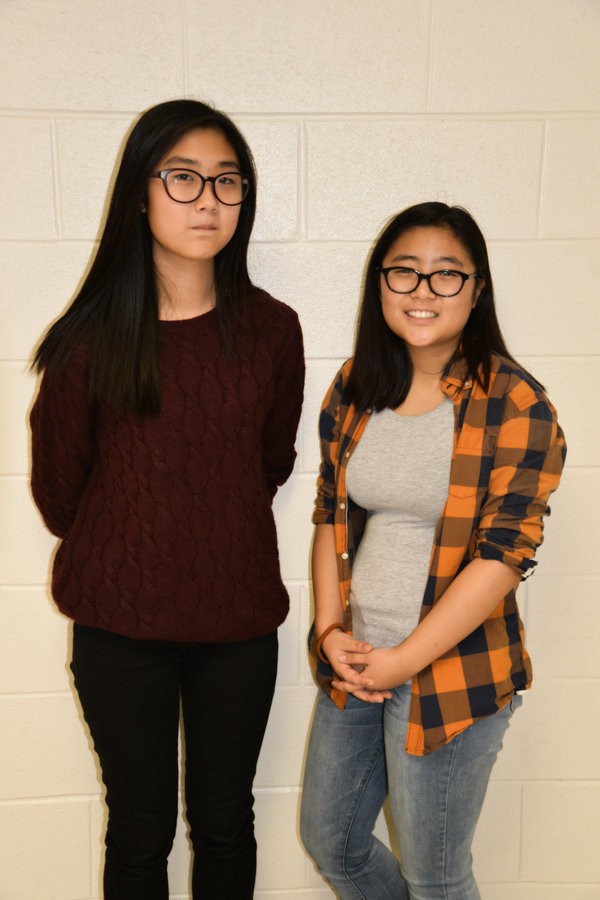Researcher Profile: Cho and Khang design all-in-one breast cancer biosensor

Sophomores Cho and Khang have designed an innovation for the early detection of breast cancer
November 28, 2015
Jefferson students sophomores Kelly Cho and Harriet Khang came together to make a new way to detect breast cancer, an all-in-one biosensor. Beginning at a summer mentorship program, the duo created a biosensor that would be able to detect possible carriers of breast cancer. The all-in-one biosensor uses a person’s blood and some enzymes to detect the possibility of breast cancer in patients.
Q-and-A: On Oct. 30, tjTODAY interviewed Khang and Cho to learn more about the all-in-one biosensor and their upcoming research plans.
Q: Can you describe your research project?
Harriet: We created a biosensor, an all-in-one biosensor for the diagnosis and prognosis of breast cancer.
Q: How long have you been working on your project?
Kelly: For around a year.
Q: Why did you choose to conduct research on breast cancer?
Kelly: We chose breast cancer because we are females and we would like to make females’ lives better. We did [this biosensor] because other methods of detecting breast cancer were really expensive and inconvenient for the general public, so we wanted to create a more sensitive and easier biosensor.
Q: How has your experience in the Siemens competition been so far?
Harriet: It has been interesting because I didn’t really expect us to go this far. It has been a really nice experience.
Kelly: This experience also makes me apply all the research and presentation skills I had to use for TJ [in integrated biology, English, and technology], so it made me realize that TJ really helped me for my presentation.
Q: What are your goals for the research project?
Kelly: To create a biosensor that everyone can use, cost-effectively and easily.
Q: What do you want to accomplish in the future with this project?
Harriet: We’re not only going to turn the biosensor into the Siemens competition, but we’re also hoping to patent it.
Kelly: And create a functioning medical device that we can use in hospitals or that we could mass produce.
Q: What obstacles have you come across during the course of your project? Were you able to overcome them? If so, how did you overcome them?
Harriet: Scheduling was a big problem first of all, because we all do our own activities. But inside of the project, I guess the times where our predictions didn’t match the actual results. Then, because most of the time our predictions were right, but there was this one instance where we were doing an experiment our predictions were completely off and we were confused for a while.
Q: So what was the problem?
Harriet: So, basically we thought that when we put CEA into the detection cell, we thought that the amount of CEA wouldn’t affect the amount of light that was given off, instead we found that the amount of light was affected, so we had to figure out a reason why the CEA affected it.
Kelly: And we had to do additional tests to make sure.
Q: What was the best part, so far, of your project?
Kelly: Well, I like the right now, where we’re preparing and we realize how much we’ve done, and how much we’ve researched to reach this point. I’m really satisfied with our conclusions, and how our biosensor has been functioning.
Harriet: I think what Kelly said was right. But, sometimes when I take a step back and look at my project, I think, “Wow, I was able to do all this stuff because…”. I’m thinking about later, and how this will affect humanity. I would really be able to benefit people, and that’s a really nice thought to have.
Q: How long do you think it will take to finish this project?
Harriet: That’s going to take a really long time.
Kelly: Because after this. we’re starting another project, related to this project, so we’re not going to be focusing on creating the medical device, our next project is another enhancement of that.
Q: What exactly is your next project?
Harriet: So, basically what we are doing is, we’re going to try to increase the accuracy of our biosensor, because using one protein is accurate; it’s not a hundred percent guaranteed factor. If you include other proteins that are markers for breast cancer, then you will be able to increase the accuracy of the biosensor.
Kelly: We want to create [a biosensor] that can detect multiple diseases in one sample.





